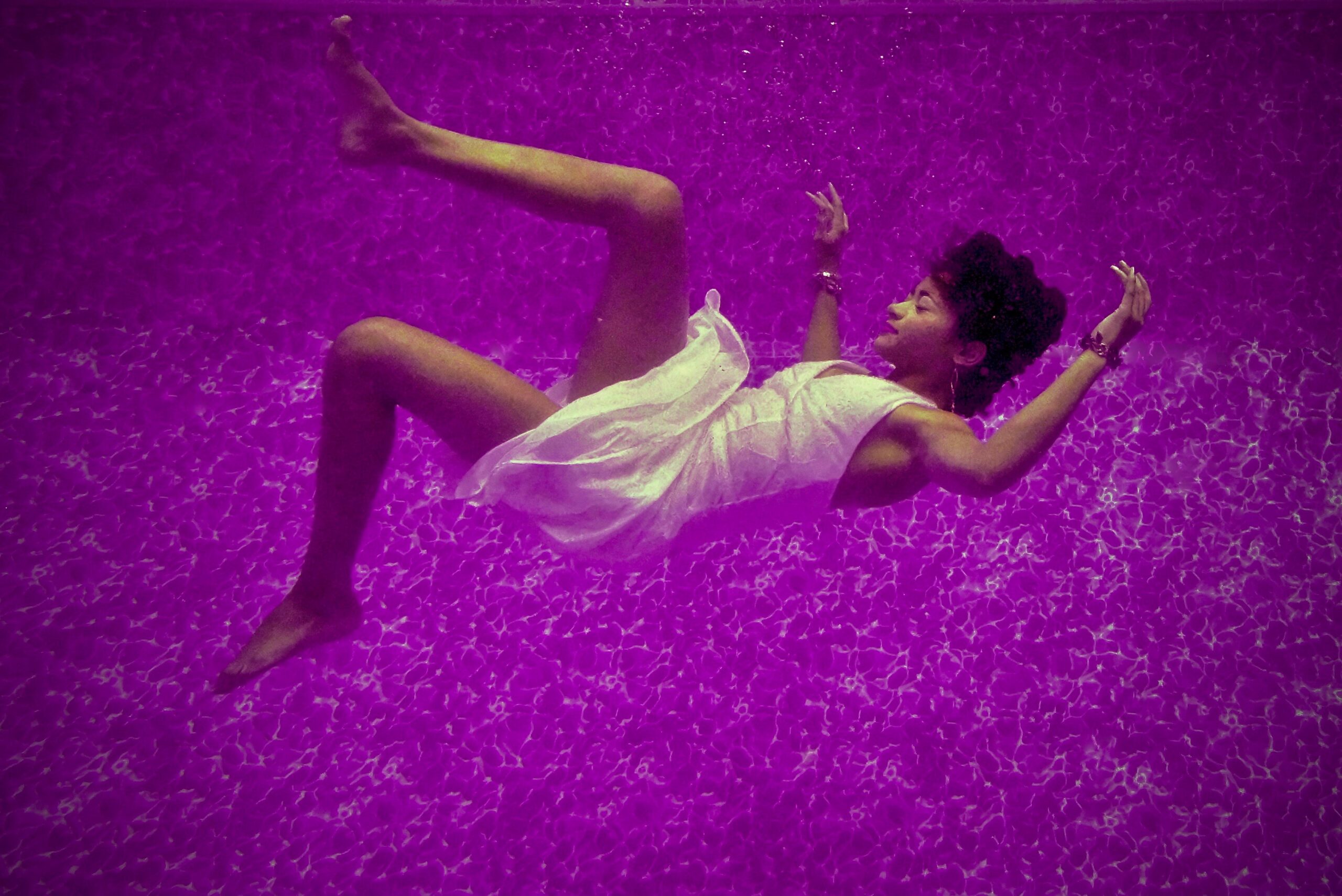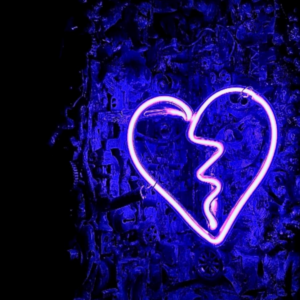Ava stands on top of the monkey bars in a way that doesn’t look possible.
Or at least it shouldn’t. Look possible, I mean. Maybe possible isn’t the right word, but either way it doesn’t seem advisable, the way she has her feet planted on the green handholds like it’s no different than the sidewalk. Her posture is perfect. She is perfectly weightless.
“It’d hurt like hell if you fell, you know,” I say.
I’m sitting on a monkey bar a few rungs away. The metal is slick with condensation and although my thighs press harshly against the metal, I still wobble with the effort it takes not to slip. The playground mulch sits in a thin damp layer only a few feet down, but it seems like the sea miles down from a cliff.
“Professor Chris at it again,” she says, and her voice makes me shiver. All I can see is her long curly ponytail, collecting droplets in the evening fog, but I hear her grin. “Sharing her big genius brain with the simple folk.”
I move to shift my weight, to chafe myself against the chill, and I know that I’m going to plummet before I do. My hands slip slick from the rung. The wet friction of my jeans tugs away from my weight.
Ava turns to look at me over her shoulder. I catch her eyes right before the perfectly Washington horizon inverts around me, trees tearing their jagged edges into the sky as they scrape past. My head makes a hollow ringing sound against the rung behind me and then my body makes a thump against the ground. The air screeches from my lungs.
There’s a hole in the bottom of Ava’s sneaker, near the toe. I can tell by the angle of her head that she’s looking at the tree line. I taste iron in the back of my throat.
“Better luck next time,” she laughs. When Ava looks down at me, the weak bluish glow of the sunset fills every line of her face—the amused turn of her lips, the totally unconcerned eyes—and I wish I liked the light as much as I like her.
The iron taste in my mouth is blood, I think.
“Anything interesting down there?”
I cough and give the answer I’m supposed to. “No.”
I mean it more than I’m supposed to. I’d rather be inside, or at the mall, trolling Barnes & Noble. I’d rather leave the playground to the actual children. I’d rather act my age.
“Didn’t think so.”
My teeth ache as I convince my mouth to give the next line: “Up there?”
It’s definitely blood, wet and hot as I speak.
“Of course,” she answers. Usually this exchange feels magic to me, but maybe I’ve been concussed into irritation.
I should let her words resonate. Instead, I say “You shouldn’t have quit gymnastics.”
“What?” Ava’s voice goes sharp.
I probe around the inside of my mouth for a second, trying to find the wound, and catch the ragged side of my tongue.
“What are you talking about, Chris,” she repeats.
“You were good. Don’t you miss it?”
I know she does. Even though she’s trying to derail me, I can’t see past the artfulness of her body as she upends herself in one swift arc and dangles from the monkey bars by her knees. Her sweater hangs over her face, putting her lacy, pilled bra on display. I don’t want to stare, but I always do.
“Do I miss being surrounded by a bunch of show-off rich bitch toddlers?”
She can’t see, I know I shouldn’t worry, but I imagine my eyes leaving a burning trail down the ridges of her ribcage. I imagine Ava undressing tonight. I imagine the carnage my gaze has made on her skin. For an odd second I envy the warmth of my own eyes.
“You could’ve been really great, though. Like, ‘get-recruited’ great.”
“You’re the competitive one,” she says. “TCC doesn’t even have a gymnastic program.”
She means Tacoma Community College. My mom’s been taking night classes there for the past five years.
“You could go somewhere else.”
Ava snorts. “We’re not doing this.”
“What are we doing, then?” This is unlike me, this quickness, the bitter blood mixing with my spit.
“If you have something better to do, be my guest.”
The darkening shadows and the shivering mist that’s beginning to clutter my breath. It’s been a freakishly cold September; the temperature’s dropping fast and I’m only dressed for forty, and I hope Ava mentions leaving before I lose feeling in my fingers. I imagine the warmth of my bed. I imagine the warmth of summer, which lasts well into September in the south, cicadas thickening the air with their cries.
“I hope you didn’t quit gym just cause you were a loser. Because you weren’t ‘get-recruited’ great or whatever.” She makes the air-quotes as she says it.
I was a loser. I only placed well in one competition, and that was after I decided to quit. Ava’s parents had already pulled her out. I didn’t start gymnastics because of Ava—my mom wanted me in a sport, hoped it would wear me out after school—but it feels that way, looking back. We met there.
I’d been practicing easy moves on the balance beam when her voice floated up to my ankles. “Are you eleven yet?”
My leotard felt too tight that instant, like I’d swelled up into a new body. The breath I took, like my coach taught me to, to get into the zone came out whispery and shallow. I could see her, just barely, at the very edge of my vision. A brown-ish blob in my memories, but in AP Psychology last week we learned that you can’t see color with peripheral vision. Everything goes gray. I must have added in that detail later, during one of the hundreds of times I’ve recalled our first meeting.
In the static of her voice, her body below mine, I tried to remember my routine.
Left foot then right foot then hands and then land it and twist and then—
“I’m eleven, but I’m actually still a fifth grader, ‘cause—” she continued, even though I hadn’t acknowledged her at all. Had I?
After one quick, brutal snap of the ponytail holder around my wrist, I pushed my left foot forward. Then right foot and hands and land it and twist then I stumbled on the roundoff and my sweaty feet skidded off the leather.
Fun fact: I always land on my head when I fall. Unless I catch myself, obviously. My body knew what to do before my brain had moved on from the embarrassment. My legs caught the beam at a right angle, calves crushed against the beam, and I hung, batlike, my ponytail and fly-aways swinging back and forth below me.
When I opened my eyes, she was an inch from my face. Her breath smelled sweet underneath the much stronger clouds of sweat and gym chalk that coated the room. She looked amazed, like maybe she’d never seen anyone fall before.
“That was really cool.” Her grin looked strange upside-down.
I strained my neck to nod. “I’m ten and three quarters. But I’m in fifth grade.”
“Cool.”
Then she watched as I removed myself from the balance beam without cracking my own skull.
The dark bitter taste of my mouth reminds me of where I am, on the damp spiky mulch, on a playground that I’m about seven years too old for. “I didn’t quit because I sucked. But I did suck.”
Ava swings up abruptly, doubling over to grab a bar with her hands, releasing her legs from her perch. She hangs there for a moment, lingering in her own grace—not the same way I do, but I think it’s something similar—and drops down to earth. Ava always lands on her feet.
“Could’ve fooled me,” she says. There could be a dozen meanings behind her sentence, or none. Sometimes Ava will say things because she knows it’ll freak people out, make them wonder, the same way she used to pretend to be a mermaid who slept in the Puget Sound at night. Knowing this doesn’t stop my stomach from clenching. She works on me every time.
Ava starts walking towards our bikes without asking if I’m ready. Probably because she knows I’m always ready to leave, always waiting on her to decide she’s done with the same afternoon again and again.
Or if not that, then just because she knows that I’ll follow her.
We have different rides home; mine is ten times as long as hers. I timed mine when I was fourteen with a cheap SpongeBob watch I got as a Burger King toy, staring at the blinking numbers as they crawled higher. Tonight, I stare dead ahead, trying to beat the creeping darkness home. Beating the sun on its way down is the only way I convince myself that the pounding of my heart comes from the exercise. I don’t know how long that’s been true. Since before I timed it, for sure.
The sun is a weird opponent for my purposes because I’m never sure when it’s actually set. I call it a victory when I avoid a black hole sky, but that might be wrong. It might be the first moment the sky dims, when the shimmery gray clouds start darkening, weakly, into nothing. If that’s the case, then I’ve never made it home. Is that right?
Anyways, it’s black outside when I drag my bike inside tonight.
“You’ll get mud everywhere,” mom says. I see the warm light surrounding her before I hear her voice, and I try to pretend it’s an angel. Don’t look at me, she might say, and I would listen.
“It’s not muddy, just wet,” I say.
“Did you not hear on the news this morning? I thought they would’ve told you. Mud is water and dirt.”
“Oh, no, they didn’t.”
“That would explain a lot.”
I look. She is where she always is in the evenings, at the kitchen table, surrounded by textbooks thicker than mine and glowing orange in the lamplight. I’m pretty sure she’s taking a statistics course right now, which would explain the baffled expression hovering somewhere behind the exhaustion in her eyes.
“How’s Ava doing?”
My jacket and shoes go in their usual pile by the arm of the couch, feeling the dusty heat enter my body through my fingers, my nose. I dissolve into it. “Fine. Do we have hydrogen peroxide?”
“Hm?”
“Bit my tongue earlier,” I explain, and the words themselves burn. I’d read somewhere once that the mouth is the fastest-healing part of the body. Mine could just be slow.
“Are you alright?” She pushes up from her chair and comes to examine my face closely—too closely—as if the only way to help is by first smelling the blood on my breath. “How’d you do that?”
“Fell.” I didn’t even need to ask. I think the peroxide’s on top of the fridge, in the basket with the Pepto and Tylenol. I move past her.
“Christine—”
“On the fridge,” I mumble, but without facing her she won’t be able to hear it.
“Do I need to reschedule the dentist?” She asks, walking past me to the phone, lifting it from the cradle like it weighs ten pounds. Her makeup is smudged around her eyes, nesting moist and feathery between her wrinkles, and my throat constricts.
“It’s nothing,” I say, turning towards my room, not stopping even to complain about the puddle that leeches into my sock.
“It’s this Friday, Christine,” she calls out as I shut my door.
“No, it isn’t mom, it’s the twentieth.” Safe out of sight I can roll my eyes, stomp my feet, the whole adolescent routine, but I don’t.
“So, they aren’t teaching you the days of the week, either? I didn’t think schools had changed so much.”
I do sigh at this one. I’m not totally clueless about the passage of time. I turn my homework in when I’m supposed to. My ass is always in front of a TV, any TV I can find, when new episodes of Buffy air. But my calendar, where I write down the big, big-picture stuff, because my mom buys one every year for Christmas and makes me hang it up, is very easy to ignore. It has inspirational quotes from female writers on it—think Virginia Woolf, Emily Dickinson, old and grainy and dead—because I fucked up and told her I thought Jane Eyre was pretty good when we read it in class.
“Seriously, Christine, I don’t want you to be all confused when I have to check you out of class. I already got the time off.”
I find the calendar hidden beneath several taped-up sketches of dogs wearing sunglasses.
Thursday the Nineteenth, apps due!!!
Friday the Twentieth, dentist 🙁
“Can you tell me what day it is now? Did you hit your head when you bit your tongue, Chris?”
“Not now, mom!” I yell.
I pull open my desk drawer. I have everything, I think. I hoard old report cards, volunteering forms, and good essays. I have everything. It’s just the putting things together part left. From the back of the draw my fingers brush against it: a single thick envelope. The one my half-blind guidance counselor pushed towards me months ago, winking and telling me you never know. I can feel the weight of it in my hand, heavier when it hits my desk. Fancy letters spelling out some school in California.
“Concussions are no joke,” my mom says, and her voice is closer, and the door opens, and then the situation becomes pitifully obvious. The air thins out until I am suffocating in this single moment. My mouth goes dry—except for the perfect little circle of iron interrupting it—and I feel myself choking on it.
In the back of my head I think, this is something that’s never happened to me before. And then I am small, and I smell the sweet citrus of my mom’s perfume and hear her breathing behind me and feel her long stray hairs catch staticky to my sweater.
“I might have fucked up,” I say.
“Language,” she says in an empty voice, and I turn to face her. She frowns, blinks hard, and sighs. “That was habit. Sorry.”
The word spins around my head in slow motion. Sorry. Which means I forgive you.
“Can you help me?”
And even though we both know she has work of her own to do, sleep of her own to miss, she says yes before either of us can break.
At three A.M. I remember the peroxide and get up from the kitchen table. My mom nodded off twenty minutes ago after she went to rest her eyes on the couch and I try to make my footsteps light.
I pour it straight into my mouth from the dark brown bottle. The peroxide foams in my mouth and I imagine I have rabies. I imagine I’m a wild bear. I think it would feel good to barrel through the woods, slamming into evergreens and blasting them into splinters. Running faster, even, than I could bike. Barreling straight to Ava’s front door.
To do what?
I blink hard and spit the bubbles into the sink. My tongue stings a bit. I feel more awake. I wonder, idly, if it would help whiten my teeth. My mouth feels very clean.
There’s a calendar over the sink, too, splattered with water marks. I wait for my heart to speed up, for the sky to press down on my neck, and it doesn’t. It only seems soft in the lamplight.
I go back to the table and work another hour. I put a blanket over my mom on the couch and go to sleep.
I wake up an hour and a half later and go back to the kitchen. Somehow my mom is already up, too, her face washed and bare, her soft purple bathrobe swallowing the rest of her. She looks surprisingly nice this way. Softer, like a mom who might bake cookies for no reason.
I sit next to her.
“Did you ever plan on telling me how much you hate it here?” She asks, her eyes trained on my last drafted personal essay. I think I went wild writing it in my foaming-mouthed delirium. I don’t remember what I said, just what it felt like: suffocation; locked doors to dark rooms; high walls creeping higher every time I looked away. And cold. Freezing cold.
“I thought it was obvious.”
“Nothing is obvious. Everybody but you is stupid. You’re supposed to spell these things out,” she says drily.
“Ha,” I say.
“The first time she laughs at my jokes and I’m not joking.” She takes off her glasses, rubs her face with big, droopy circles. “I guess that’s my point.”
“I know, I’m young, I’m stupid, I don’t know anything. Every teenager knows. We get it.”
“I won’t pretend you’re not stupid—even just one extra day’s notice on this would have been nice, you know—but you’re still going to be the person who knows you best.”
“I don’t think this is your line. Shouldn’t mothers know everything best?” My own voice is still dragged down by sleep. The conversation feels somehow opposite to last night, at my desk, in front of a buried calendar. It feels like the only moment there’s ever going to be.
“Nobody else knows you. It’ll always be guesses. So you’re supposed to help out when you can.”
I have the nagging sense that I’m missing something, but I don’t say. I nod and pull the essay from her hands. “Well. I hate it here, mom.”
“God, me too.”
It should come as a surprise.
.
I’m at the post office by four p.m.—hours early, mostly because my mom called us both in deadly sick to work and school and coached me through four different UC applications—and the clerk gives me an especially warm smile as I hand her my envelopes.
I did win one competition before I quit gymnastics. It’s hard to remember the feeling of it now. It was hard to feel it then. I can’t remember any rush, or any smile when I stuck the landing, when the judges wrote scores twice as high as what I usually received.
I remember Ava’s face in the crowd. Bewildered.
Outside of the post office, there’s the same moment: Ava, straddled over her bike, her curly hair windswept and her face breaking into her version of a frown.
I give her a smile as I walk towards my own bike, chained outside the store.
“Hi,” she says.
“Hi,” I say.
“Whatcha mailing,” she asks. Her voice is tight and high.
“College applications.”
“Like, plural?”
“What?”
“Like multiple applications.”
A woman with a stroller says, “Excuse me,” and opens the post office door awkwardly with her free hand.
“Should we talk somewhere else?” I ask.
Ava’s eyes flit from me to the lady to the road. “Playground,” she says, and takes off.
I hop onto my bike and take a different route. Partially because I know it’s faster, but I think, too, that I want her to worry I’m not coming. I want her to turn to look for me behind her and find nothing. I want another new staticky moment.
The playground, green and purple and yellow and small, really, like the whole thing could fit on a postage stamp, is empty when I get there. I scramble up the slide and sit at the top. Aside from my feet sticking out, the plastic cover encapsulates me. I can hear Ava coast up, but I can hear her bike crash onto its side better.
She waits for a few minutes. I look at my watch, wait for two more to pass, and then slide out. “Oh, you’re here,” I laugh.
“Jesus—” she says, and I turn to see her small body plummet from the monkey bars.
“Oh, shit, Ava!” I yell, but I laugh hard, too, running towards her. For no reason, of course. The only part of her that hits the ground is her holey shoes.
“I could’ve gotten hurt, Chris!” She stomps.
“No way,” I say, widening my eyes as far as they go—which isn’t far, considering their sandy sleep-deprivation.
Her face grows pink against her tawny skin, which could be embarrassment, anger, anything. I don’t know what’s most likely. “Grow up.”
“I’m trying to!” I don’t want to sound like I’m losing it, I want this to come out very dignified and mature, but everything is sharp and cold and hilarious.
“Is that what you think—” Ava stomps again, flustered by my laughter “—is that what you think you’re doing? Leaving town isn’t growing up, Chris.”
“Staying is?”
“I’m not saying that, but it’s not—you’re—”
“I’m what, Ava?”
“Could you stop fucking laughing?” She yells, her voice bouncing around the tall trees that crowd us like the audience of a fight.
“You laugh when I fall,” I counter back, although her explosion tampers my cackles down to giggles.
“So?”
“So I thought that’s just what we did.”
“That’s just what I do,” she says.
“I’m going to start laughing again.”
“Can you not take this seriously?”
I stop giggling. I look at Ava. Standing right in front of me she looks much different. Her hair seems much longer, careening for the ground. She’s a good two or three inches shorter.
“Let’s try this,” I say. “Tell me what you want, and I’ll tell you if I want it, too.”
Her eyes shine like a flare, painfully bright, and I realize she’s going to cry. “What is wrong with you?”
I wait for my heart to chime in. It doesn’t.
“What do you want, Ava?”
She looks around, as if for support, some unexpected ally waiting in the wings, and when nothing materializes, she sinks at least another inch.
I want to hear her respond. I want to hear her steady voice try to fight, feel the mean relief that comes when somebody else says the wrong thing.
Instead, Ava grabs my shoulders, hard enough that it kind of hurts, and kisses me.
I still against her lips, her cheeks freezing against my burning ones, my brain seizing with surprise. My eyes fly wide open—and I see hers are closed, hers are as close to mine as they’ve ever been—and I stare at her lush eyelashes and the freckles on her nose.
By the time my lips have warmed hers she’s pulling away.
“Stay with me, Chris?” she asks. It’s small. It’s simple.
This is the closest I’ve ever been to her and for some reason all I can think of is how hard it is to breathe with my nose smushed against hers.
The taste of her lingers in my mouth. I can tell she had beef-flavored ramen noodles before she came here. I pull away and let the cold air flood my nostrils. I want to have a beautiful, soft expression. I want to be won over. I know I’m not.
Ava looks into my eyes and then she knows, too. And then her faces falls, eyebrows crumpling into crinkled eyes into tense, wavering, lips.
And this is beautiful part of the evening: neither of us say another word.




